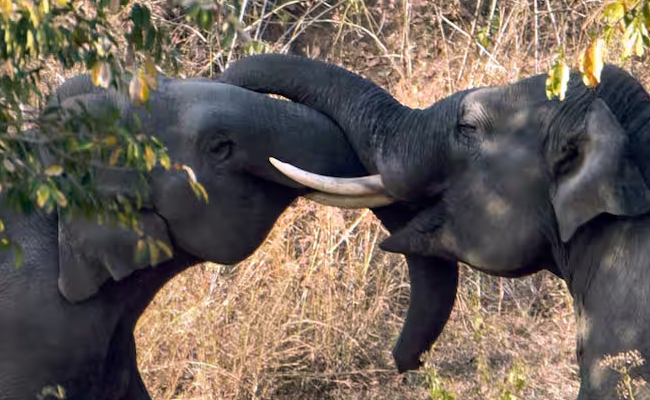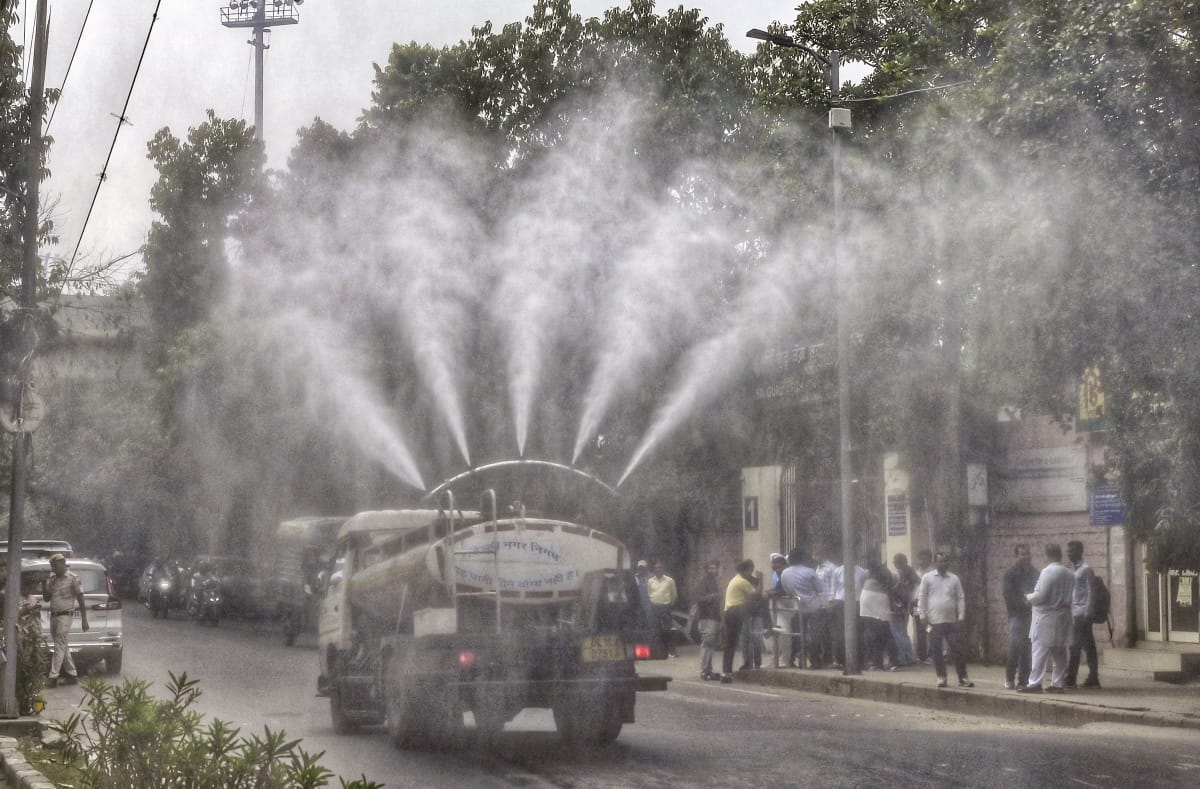Bhopal (PTI): Samples collected in connection with the death of 10 elephants in three days in Madhya Pradesh's Bandhavgarh Tiger Reserve are being sent to ICAR-Indian Veterinary Research Institute in Uttar Pradesh and a forensic laboratory in Sagar, officials have said.
Madhya Pradesh Chief Minister Mohan Yadav on Friday chaired a high-level meeting during which the government decided to send a state minister and top forest officials to Umaria to probe the elephant deaths, they said.
Meanwhile, a senior veterinarian linked to the probe cited staffers at the reserve and said the elephants fell to the ground and shivered before dying.
On Tuesday, four wild elephants were found dead in Sankhani and Bakeli under Khitoli range of the Bandhavgarh Tiger Reserve (BTR), while four died on Wednesday and two on Thursday.
Talking to PTI on Friday over phone from the BTR, Additional Principal Chief Conservator of Forest (Wildlife) L Krishnamoorthy said, "We are sending all the samples we have collected from the field and also organs, like viscera, liver, kidney, etc to the IVRI in Izatnagar in UP's Bareilly as well as the MP forensic laboratory in Sagar."
He heads the five-member committee appointed by the state government to probe the death of the tuskers in Bandhavgarh, which is spread across Umaria and Katni districts in eastern Madhya Pradesh.
Krishnamoorthy had earlier said samples (viscera) of the elephants were sent to Jabalpur-based School of Wildlife Forensic and Health (SWFH) to find out toxins, if any, and the cause of death.
He was responding to a query on whether the elephants had consumed poisonous pesticides sprayed in the field.
"Only after the reports come in we can arrive at a conclusion on the cause of the death. Post mortem reports suspect it could be due to Kodo millets," MP Principal Chief Conservator of Forest (PCCF-Wildlife) VKN Ambade told PTI.
Citing staffers at the BTR, a senior veterinarian said the pachyderms fell to the ground and shivered before dying.
A ground duty officer said the forest department has identified six farmers from whose field the jumbos ate kodo millets, adding reports will clarify if any pesticide was mixed or sprayed on the crop.
Meanwhile, a five-member team of Delhi-based Wildlife Crime Control Bureau continued their probe into the deaths on the second day on Friday.
Officials said the Nagpur-based regional officer of the National Tiger Conservation Authority, assistant inspector general of forests Nandkishore Kale, continued his investigations at the BTR.
"The state tiger strike force also visited nearby agricultural lands, paddy fields, water bodies etc in connection with the kodo millets. All the dead elephants were part of a herd of 13. One of the dead elephants was male. The remaining three in the herd are healthy. They are being monitored," another official said.
Krishnamoorthy earlier said veterinarians had suggested chances of (presence of) mycotoxins associated with kodo millets.
Mycotoxins generate cyclopiazonic acid that causes poisoning in kodo millets, he said.
The forest department's wildlife veterinarians are consulting experts of Indian Veterinary Research Institute (IVRI) Bareilly, Wildlife Institute of India (WII) Dehradun, State Forensic Science Laboratory, Sagar, and Centre for Cellular and Molecular Biology (CCMB) Hyderabad to get details about the mycotoxins, he said.
The Special Investigation Team (SIT) and special task force are investigating the case from all angles, the official added.
The Krishnamoorthy-led panel has been asked to submit its report in 10 days.
Some wildlife experts said it may be the first instance in the country when 10 elephants have died in a span of three days.
Talking about the meeting chaired by CM Yadav, an official said, "The government has decided to send minister of state for forests Dileep Ahirwar, additional chief secretary (forest) Ashok Barnwal and the state's head of forest force (HOFF) Aseem Shrivastava to Umaria district to probe the elephant deaths. They will submit their report in 24 hours."
"Strict action will be taken against the guilty. The meeting was also attended by state chief secretary Anurag Jain and Rajesh Rajora, additional chief secretary to the chief minister," he added.
Let the Truth be known. If you read VB and like VB, please be a VB Supporter and Help us deliver the Truth to one and all.
New Delhi: IRS officer Sameer Wankhede has submitted his reply to the Delhi High Court in the defamation case he filed against Red Chillies Entertainment, the production company owned by actor Shah Rukh Khan. The case pertains to the recently released series The Ba**ds of Bollywood*, which Wankhede claims has defamed him.
In his statement to the court, Wankhede asserted that the show’s portrayal of a police officer is clearly based on him and has caused serious harm to his public image. He cited four key reasons supporting his claim.
First, he said the character in question bears physical similarities to him, including facial and body features. Second, he noted that the character’s working style and mannerisms closely resemble his own.
Third, Wankhede highlighted that the officer in the show is depicted making a high-profile arrest involving a major film personality, which he said directly mirrors his own involvement in the Aryan Khan drug case.
Fourth, he pointed out that the character frequently uses the phrase “Satyameva Jayate,” a motto he himself had used during media interactions in the course of that investigation. He argued that using the national motto in such a context cannot be dismissed as creative expression or humour.
Wankhede also referred to an interview in which Aryan Khan allegedly admitted that the show was “inspired by some real events.” This, he said, contradicts Red Chillies Entertainment’s claim that The Ba**ds of Bollywood* is purely fictional.
He further alleged that the tone and intent of the series indicate personal and institutional vendetta, aimed at discrediting and defaming him rather than engaging in artistic storytelling.
Wankhede informed the court that the fallout from the show has affected his family, with his wife and sister receiving abusive and vulgar messages online.
Rejecting Red Chillies’ argument that he is a “thin-skinned” officer, Wankhede said that a public servant cannot be expected to tolerate false and damaging portrayals simply because of his position. He emphasized that his legal action seeks to protect the constitutional rights and dignity of both himself and his family.





